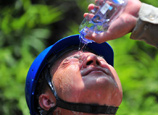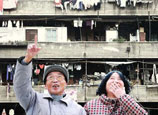
By Ma Liya, People's Daily Online June 19, 2012
In 1840, national hero Lin Zexu argued that“the harm of opium is far greater than fierce floods and savage beasts. It is the responsibility of all people all over the world to boycott opium and narcotic drugs!”
In April 2004, General Secretary Hu Jintao listened to the report given by the National Narcotics Control Commission on the national anti-drug work. He pointed out that “narcotics control is concerning the physical and mental health and the wellbeing of the people, as well as the security and prosperity of a nation.”
In December 2007 and June 2011, the Anti-drug Law and the Regulation on Drug Rehabilitation were respectively adopted. Hence, a new work pattern of community-based treatment and rehabilitation has been established. New explorations on in-depth and personalized narcotics control have been carried out in local places.
In 2011, in the process of strengthening innovative social management nationwide, the Government of Guizhou Province has put emphasis on the narcotics control issues, and found a new way of community-based treatment and rehabilitation after years of exploration and practice. It is a “four-in-one” rehabilitation model by integrating “physiological detoxification, psychosomatic recovery, job placement and social inclusion”. It takes “job placement” as core, and “Sunshine Enterprises” as carrier based on the practical conditions of Guizhou Province.
In June 2012, the “Sunshine Project” became completely open to the media. A nine-member-team jointly constituted by journalists from People’s Daily and People’s Daily Online went to Guizhou for on-site visit. During the seven-day visit, they traveled 3,000 kilometers, visited eight cities and interviewed almost 100 people. Duyun and Bijie are two regional blueprints for the “Sunshine Project” practice in Guizhou. During our work in these two places we kept wondering …

















 China's Chongqing issues orange-coded alert of heat
China's Chongqing issues orange-coded alert of heat


![]()
